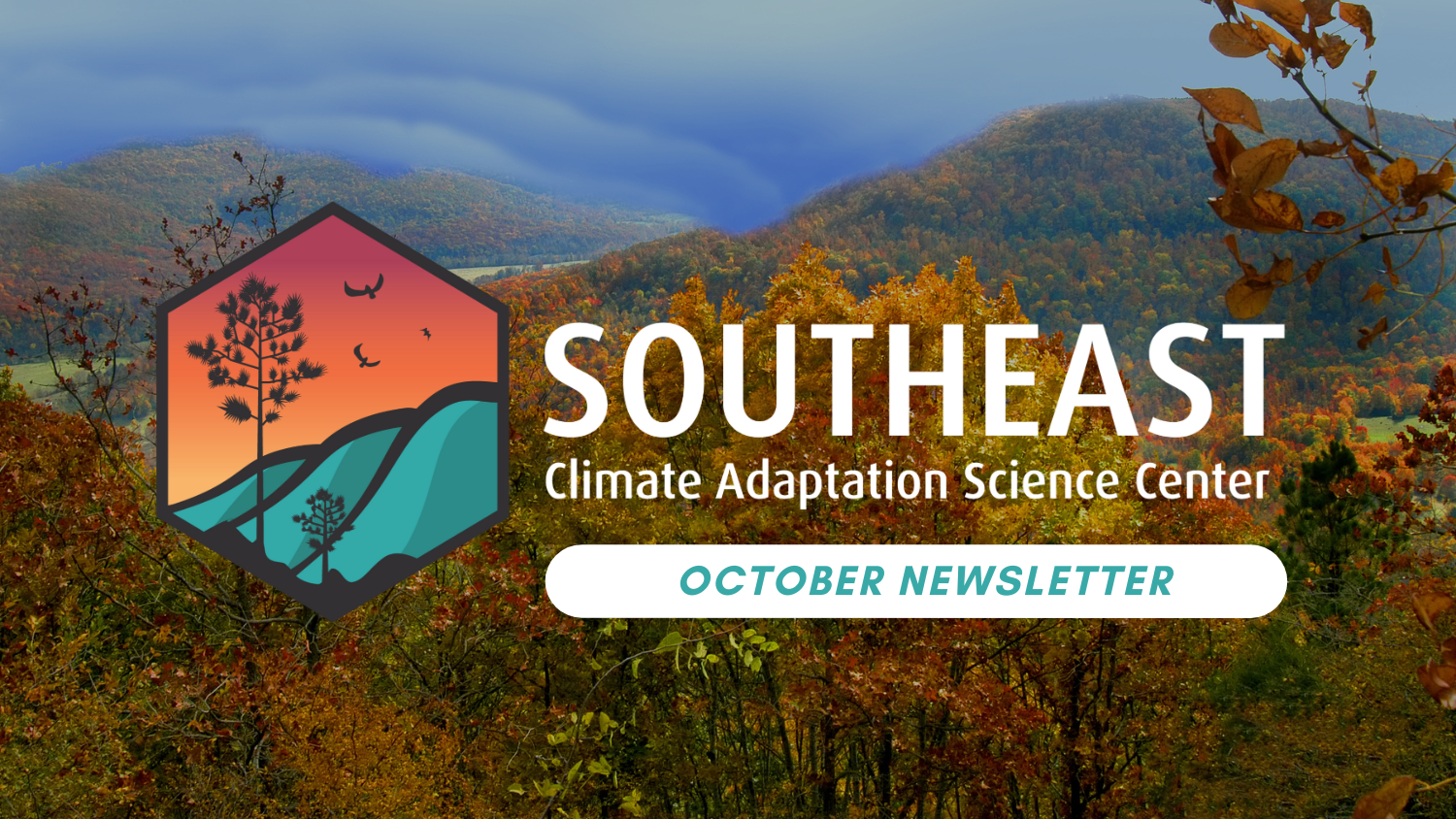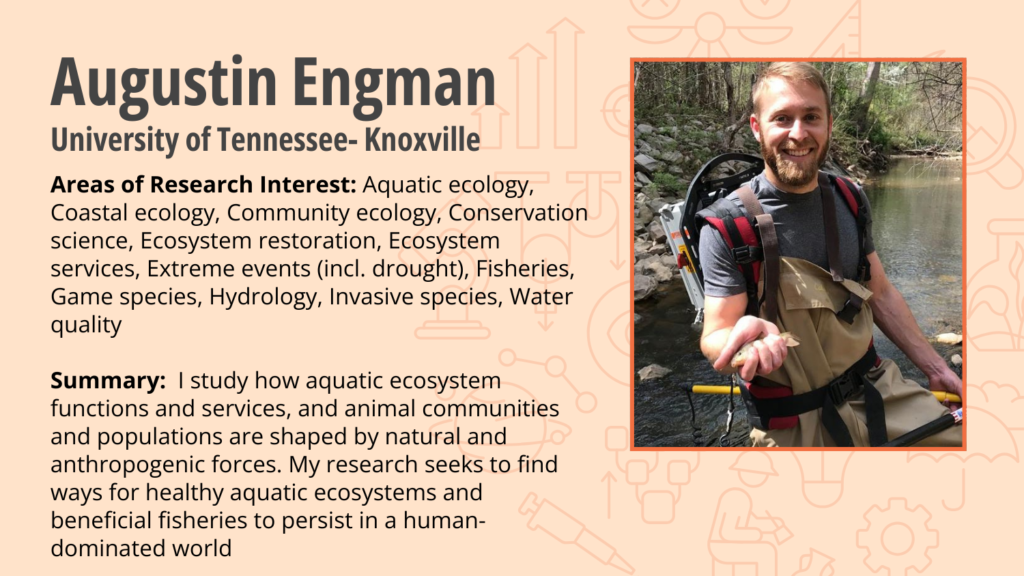October 2024 Newsletter

Get our newsletter in your inbox by subscribing here.
Southeast CASC News
Hurricanes Helene and Milton have affected the majority of the Southeast and have devastated places that are home to our colleagues, family, and friends. We hope that you keep the Southeast in your thoughts for the long recovery ahead. Our colleagues at the NC Climate Office documented their rapid reaction and data on Helene here.
There’s still time to register for the science seminar on “Climate and land-use change impacts on the distribution and abundance of non-native fish in the Tennessee and Cumberland River Basins” featuring Xingli Giam happening tomorrow, Oct 23 at 1pm ET!
Read the latest researcher spotlights on 2024-25 Global Change Research Fellows where Bigyapti Nepal tells us about her work with harmful algal blooms and Halina Pyzdrowski explains how she co-designs with communities to help them become more resilient to flooding.
Mitch Eaton, Adam Terando, and Jaime Collazo’s paper “Applying portfolio theory to benefit endangered amphibians in coastal wetlands threatened by climate change, high uncertainty, and significant investment risk” in Frontiers in Conservation Science uses modern portfolio theory to help protect coquí populations in Puerto Rico.
Adam Terando joins the SE CASC podcast to talk about climate adaptation, climate anxiety, and his career as a federal scientist.
The 2024-25 Global Change Research Fellows are hosting the Fall Global Change Seminar on watershed resilience in the Southeast United States and the trans-coastal sustainability management in Rostock, Germany, happening November 8, 10:30am ET.
2023-24 Global Change Research Fellow, Thomas Thelen is the lead author on a new study on coastal flooding in Water Research.
Paul Tallie, 2016-17 Global Change Research Fellow, is featured in a Coastal review article on how species adapt to climate change.
Mike Blazier is interviewed on an episode of the Food, Farms & Forests podcast about restoring Arkansas’s bottomland hardwood forests.
Lydia Olander and Katie Warnell published “Advancing consistent socio-economic monitoring of coastal ecosystem restoration through collaborative metric development” in Communications Earth & Environment.
Did you miss our last science seminar? Watch the replay to catch up on the 2024-25 Global Change Research Fellows 3-minute thesis talks.
We’ve had 21 responses to our newsletter evaluation form, will you help us hit 30?! Please take a few moments to fill in our anonymous newsletter evaluation, and help us improve our communications with you.
Research Affiliate Spotlight

View a searchable list of all SE CASC Research Affiliates and find your next collaborator!
Community News from the Southeast
Partners
The SECAS Atlas now has map services for the FUTURES urban growth models.
The latest Conservation Corridor is about incorporating human perspectives into identifying wildlife corridors.
The 2025 NC WRRI Annual Conference is accepting abstract submissions until Nov 18.
Tribal
Visit USET Climate Change Headlines for updates and highlights from across the USET region.
USET has put together resources on Climate Adaptation 101.
The Miccosukee and Seminole Tribes are highlighted in the tenth biennial review of the Comprehensive Everglades Restoration Plan amidst historic levels of Everglades restoration progress.
Gatherings
Webinars
- Oct 22 | 10AM ET | NOAA Science Seminar: U.S. Southeast Climate Webinar and Review of the Growing Season
- Oct 23 | 1PM ET | SE CASC Science Seminar: Climate and land-use change impacts on the distribution and abundance of non-native fish in the Tennessee and Cumberland River Basins
- Nov 8 | 10:30AM ET | Global Change Research Fellows Fall Seminar: Watersheds in the Southeast US and Rostock, Germany
- Nov 21 | 10AM ET | Third Thursday Web Forum: What’s New in 2024- The latest updates to the Southeast Conservation Blueprint and SECAS Goal Report
- Nov 26 | 3PM ET | Climate and Societal Interactions Division Nature-Based Solutions Webinar 3: Building Coastal Adaptive Capacity through Nature-Based Solutions
Events
- Nov 13 | Envisioning Urban Futures: Charlanta | Raleigh, NC
- Dec 9-13 | RESCHEDULED: 78th Annual Conference, Southeastern Association of Fish and Wildlife Agencies | Augusta, GA
Find more events on our calendar.
Resources and Publications
Resources
- What Climate Change Means for Tourism. Hurricanes, rising sea levels and other climate-fueled hazards are wreaking havoc on tourism-dependent communities around the world.
Publications
Marshes to mangroves: Residential surveys reveal perceived wetland trade-offs for ecosystem services. Landscape and Urban Planning
Waterfront residents in the northern Gulf of Mexico were surveyed to understand how they perceive marshes’ and mangroves’ ability to deliver fisheries ecosystem services. Where residents live, the condition of the marsh shoreline, preference for marsh shorelines, fishing frequency, and household income were all found to be significant predictors of perception. For example, participants surveyed from Florida where mangroves are most prevalent and who frequently fish exhibited stronger preference for mangroves. An unexpected result was that residents with marsh shorelines perceived mangroves to be better at delivering fisheries ecosystem services.
Ten “simple” rules for non-Indigenous researchers engaging Indigenous communities in Arctic research. PLOS Computational Biology
Researchers conducted a literature review of best practices for collaborating with Indigenous communities in the Arctic. From this review, they distilled “Ten Simple Rules” as a starting point for non-indigenous researchers to understand before, during, and after research collaborations with Arctic Indigenous communities.
Responses of plant species to mechanical soil disturbance in fire-dependent pine communities of the North American Coastal Plain – a synthesis. Forest Ecology and Management
Researchers found that responses to mechanical soil disturbance are predictable for most species of “old-growth” grasslands and savannas. In general, those that responded negatively tended to have a perennial life span, lack the ability to form a persistent seed bank, and be restricted to a narrower geographical range. Meanwhile plants that responded positively tended to have an annual life span, a persistent seed bank, and a widespread geographic distribution. They also found that species did not always respond the same way to a single disturbance in the short-term and repeated disturbance in the long-term.
Opportunities
Student Announcements
The NOAA Dr. Nancy Foster Scholarship Program is accepting applications. Pre-applications due by Oct 31.
The HBCU Climate Change Conference is accepting student abstract submissions. Due by Dec 15.
Hiring Announcements
The Sapelo Island National Estuarine Research Reserve is hiring a Research and Monitoring Program Coordinator. Apply by Oct 24.
The Mississippi Cooperative Fish and Wildlife Unit is hiring an Assistant Unit Leader. Apply by Oct 24.
The University of Wisconsin–Madison is hiring an Assistant Professor of Climate Change Ecology. Apply by Nov 24.
US Forest Service Southern Research Station is seeking a Mature and Old-Growth Forest Ecology ORISE fellow. Apply by Dec 6.
Northeast CASC is seeking an Improving Decisions in the Context of Climate Adaptation ORISE fellow. Rolling applications with a start date of Dec 2.
USET is hiring a remote Climate Program Manager. Open until filled.
The Sunny Day Flooding Project, jointly at UNC Chapel Hill in the Global Hydrology Lab and the Coastal Hazards Lab at North Carolina State University is seeking a postdoctoral researcher. Open until filled.
The Climate Assessment for the Southwest at the University of Arizona is hiring a Postdoctoral Research Associate. Open until filled.
Archbold Biological Station is hiring an Executive Director/Chief Executive Officer. Open until filled.
The Nicholas Institute for Energy, Environment, and Sustainability at Duke University is seeking a Research Analyst for their Ecosystem Services Program. Open until filled.
Funding Announcements
The Nature Conservancy and Wildlife Conservation Society request proposals for their 2024 Science for Nature and People Partnership. Concept notes due by Nov 1.
USGS Cooperative Landslide Hazard Mapping and Assessment Program grants are open for state, territorial, local, and Tribal governments to apply. Due by Jan 15, 2025.
Burroughs Wellcome Fund has committed $10M for Climate + Health Excellent Centers (CHEX). Proposals are due August 2025.
- Categories:
